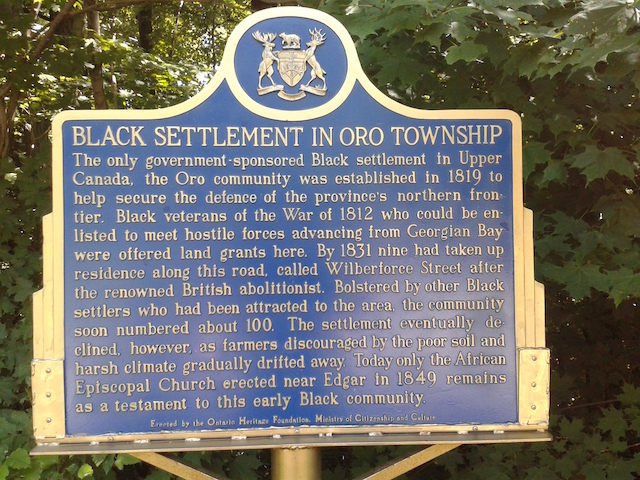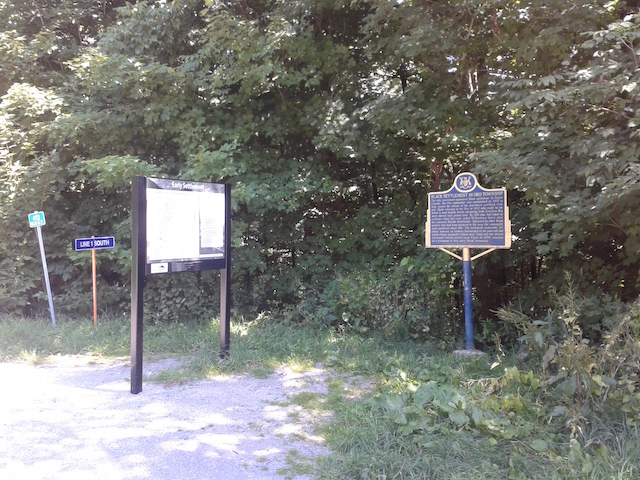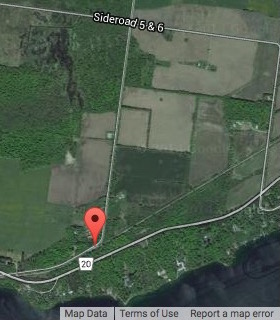Discover Ontario's history as told through its plaques
2004 - Now in our 12th Year - 2016
To see what's new on this site, you can visit the Home Page
Looking at this page on a smartphone?
For best viewing, hold your phone
in Landscape mode (Horizontal)
Black Settlement in Oro Township

Photos by contributor Fraser Elford - Posted July, 2015

Plaque Location
The County of Simcoe
The Township of Oro-Medonte
On 1 line South at the Oro-Medonte Rail Trail
Coordinates: N 44 23.942 W 79 37.395 |
 |
Plaque Text
The only government-sponsored Black settlement in Upper Canada, the Oro community was established in 1819 to help secure the defence of the province's northern frontier. Black veterans of the War of 1812 who could be enlisted to meet hostile forces advancing from Georgian Bay were offered land grants here. By 1831, nine had taken up residence along this road, called Wilberforce Street after the renowned British abolitionist. Bolstered by other Black settlers who had been attracted to the area, the community soon numbered about 100. The settlement eventually declined, however, as farmers discouraged by the poor soil and harsh climate gradually drifted away. Today only the African Episcopal church erected near Edgar in 1849 remains as a testament to this early Black community.
Related Ontario plaque
The African Methodist Episcopal Church of Oro
Puce River Black Community
More
Information
More
Settlements
More
Black History
Here are the visitors' comments for this page.
> Posted October 4, 2016
My name is John Walker Thunder Heart. My maternal grandmother is Maggie Smith. My mother is Florence Flossie Smith. Her half brother is Earl Smith.
My number is 604-312-8010.
My email address is
> Posted July 31, 2012
1. The plaque was torn off its pedestal sometime in 2011 by vandals. It was found in a bush, and restored somewhat, with the intent of putting it back in the same place. As of July 2012 it has not yet been re-installed, but that certainly will be done.
2. Re: "Black" vs. "African-Canadian": I'm the author of the book the Oro African Church, and deliberated long on which term to use. After consulting widely with friends who are Black, and, noting that there is a "Black History Society" in Ontario, and concluding that Blacks in Canada (at least those I've consulted) do not particularly want to use a comparable phrase as is used in the U.S. i.e., African American, I have been using the term Black with a capital "B", almost as if it replaces the proper word "Negroid". To me this more sensitive term properly describes a race vs. place of origin 400 years ago.
When I helped draft the national historic site plaque, I used Black but noticed the federal government historians changed the word in some places, but not in others, to African-Canadian. It could be argued that for about 300-400 years Blacks have been in the Caribbean, and in North America proper, so their roots back to Africa cause us to go back that far, in order to have a 21st Century descriptive name. So it's a toss up: do you use a 'race term' or a 'place of origin term'?
I conclude that one should not get overly excited by others using one term rather than another. As I've said, after considerable thought I now use the race term Black rather than a Canadianised version of an American term suggesting place of origin. (Six of one, half a dozen of the other.)
It's a fluke that I've run across this posting, and I'll likely never return to it. If there is someone who needs info on the Oro Black Settlement, contact me by e-mail:
Re Bush comment: there's a Bush in Sarnia Ontario with a link to the Oro Black Settlement
Re the Davenport comment, there is a wonderful archive of Davenport photos and correspondence held by a "Davenport" descendant, Margaret Cole, who lives in Hillsdale. She is quite elderly, but there is an excellent historian quite involved in that archive who will see, when the time comes, that the archive is suitably preserved.
Re the Morris comment - Can't help much other than refer you to the books, the Oro African Church, edit by Tim Crawford, and Men of Colour, by Gary French. The later is just excellent in presenting family trees of the Oro Black Settlers.
Tim Crawford, Oro ON Canada
> Posted August 3, 2011
I have been searching for this plaque and with the help of this page, I finally found the site. But no sign of the plaque nor the ferns that appear in the picture which explains most of my difficulty in locating it. The trees to the left in the picture and the poles to the right assured me that the location was correct. Also, there are small signs across the road identifying this location and the African Methodist church location. The signs are almost hidden by leaves on nearby trees. So what happened to the plaque? Oro Township merged with Medonte Township and it is now collectively Oro-Medonte Township. Was the plaque removed to make this change? The location is on the north side of Ridge Road between Line 1 South and 5/6 Sideroad almost opposite 3025 Ridge Road.
> Posted December 2, 2010
Is writer 'tmc' (below) suggesting "African-American" be used instead of "Black Settlement"? Either one works, but I'm not sure how one gives more respect than the other. 'African-American' references a continent (Africa) and either a hemisphere (Americas) or another continent (N. America), and so would include the Caribbean, Canada, and the US. 'African-Canadian' is, I suspect, a reaction to 'African-American' when applied only to Blacks in the US to the exclusion of others. That's an error. The term can easily cover both, just as Native American can. 'African-Canadian' and 'Native Canadian' invoke the idea of our modern nation, rather than a historical continental reference which I believe is meant. For more discussion, see entries on the Holland's Landing Depot plaque page. -Wayne
> Posted September 11, 2010
Hello - I am doing family research, which led me to Oro! My family goes back to Noah Morris, who was apparently sold the land for the African Methodist Episcopal Church. I am seeking anyone who is connected or has knowledge of the Morris family who settled in Oro. I had no idea I had Canadian roots, or how deep they were, until a few years ago! My email address is
> Posted June 7, 2009
This plaque is a great testament to the brave African-American veterans and free individuals who settled in Oro. However, labelling it "Black Settlement" does not give proper respect and recognition to African-Americans. The term "Black" merely identifies various cultural groups which include Africans-Americans, African-Candians and Caribbean-Canadians. This plaque should be changed to properly identify the brave group of people who immigrated here so long ago.
> Posted September 23, 2008
I am looking into family history of a friend, the settler was Wm. Davenport. If anyone has info, please send to
> Posted July 18, 2008
I am a desendent of James P. Bush of Oro county, trying to get in contact with any one who gets this comment. My name is James Bush of St. Catharines, Ontario. My email address is
Here's where you can sent me a comment for this page.
Note: Your email address will be posted at the end of your comment so others can respond to you unless you request otherwise.
Note: Comments are moderated. Yours will appear on this page within 24 hours (usually much sooner).
Note: As soon as I have posted your comment, a reply to your email will be sent informing you.
To send me your comment, click .
Thanks
Alan L Brown
Webmaster
Note: If you wish to send me a personal email, click .